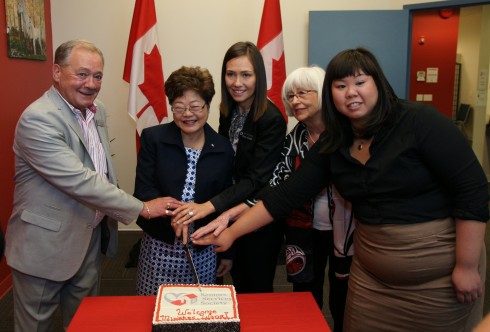Information
Prior Content
Search
Links
Government of Canada helps seniors who are homeless or at risk of homelessness in Metro Vancouver
New Westminster, British Columbia, August 21, 2013—Vulnerable seniors will have access to the help they need to avoid homelessness, as a result of Government of Canada support for a local organization. Alice Wong, Minister of State (Seniors), today announced funding on behalf of the Honourable Jason Kenney, Minister of Employment and Social Development, for the Seniors Services Society at an event hosted by the Society.
“Our government is giving a hand up to vulnerable Canadians to help them meet certain basic needs and break free from the cycle of homelessness and poverty. We are pleased to support the Seniors Services Society in its efforts to find local solutions to local problems,” said Minister Wong. “By partnering with local organizations to provide essential services to people in need, we are doing our part to prevent and address homelessness in Metro Vancouver.”
With Homelessness Partnering Strategy funding of more than $323,000, the Seniors Services Society will provide support services for seniors who are homeless or at risk of homelessness. The Society’s outreach workers will help vulnerable seniors find or keep long-term, affordable and safe housing.
“The impact of outreach services is phenomenal! Our outreach workers help seniors navigate through a system that demands normalcy which is impossible when one is living their days in crisis and trauma,” said Anna Truong, Manager of Housing Services, BC Seniors Services Society. “With the help of HPS funding last year, our outreach team housed over 110 seniors.”
The Government of Canada’s Economic Action Plan 2013 proposes $119 million per year over five years for the HPS using a Housing First approach as an effective way to reduce homelessness.
“Housing First” involves giving people who are homeless a place to live first, and then providing the necessary supports (e.g. for mental illness) to help them stabilize their lives and recover as best as possible.
– 30 –
Backgrounder
Homelessness Partnering Strategy
The Homelessness Partnering Strategy (HPS) is a unique community-based program aimed at preventing and reducing homelessness by providing direct support and funding to 61 designated communities across Canada.
Economic Action Plan 2013 proposes $119 million per year over five years, until March 2019, for the HPS using a Housing First approach. This represents nearly $600 million in total new funding.
“Housing First” involves giving people who are homeless a place to live first, and then providing the necessary supports (e.g. for mental illness) to help them stabilize their lives and recover as best as possible. “Housing First” can be an effective tool in solving chronic homelessness while reducing pressure on other shelter, health and justice services.
Since the launch of the HPS in April 2007, the Government has approved over $745 million for projects to prevent and reduce homelessness across Canada. The HPS provides structures and supports that help people who are homeless or at risk of homelessness to achieve self-sufficiency and participate fully in society. This model seeks to address homelessness by working in partnership with the provinces and territories and other federal departments, as well as with communities and the private and not-for-profit sectors.
The availability of safe, stable housing and related supports is an important element in addressing homelessness and helping individuals who are homeless achieve greater self‑sufficiency and a better quality of life. The Government’s investments are creating jobs, stimulating local economies and improving the quality of life for many Canadians.
By working with all our partners, we will maximize results to make a lasting difference in the lives of vulnerable Canadians. The HPS provides the support that our community partners are seeking.
The HPS has adopted a Housing First approach, recognizing that housing stability is an important first step in addressing homelessness. It is also necessary for the success of other interventions such as education and training, the development of life skills and the management of mental health issues.
For more information on the HPS and its seven funding streams, please visit www.hrsdc.gc.ca/homelessness.
